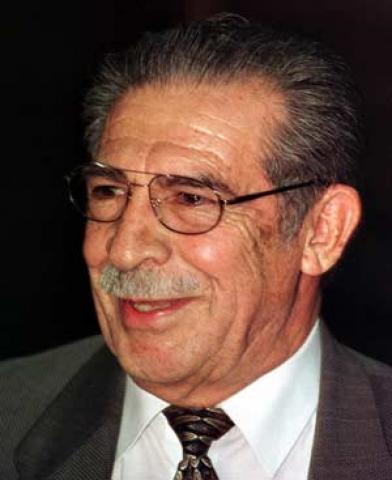
After nearly 30 years, Efrain Ríos Montt finally will face trial for genocide and crimes against humanity. Ríos Montt was Guatemala's president for 17 months during 1982 to 1983, when at least 1,771 people were killed, 1,445 raped and nearly 30,000 displaced, the bloodiest period of the country's brutal 36-year civil war. The following article was published in the March-April 2012 NewsNotes.
Ríos Montt enjoyed immunity for years as a member of Congress, but on January 14 his 14-year term ended, and charges against him were allowed to proceed. Less than two weeks later, on January 26, a Guatemalan court determined that there is sufficient evidence to formally charge the former dictator. Prosecutors say they have proof that Ríos Montt directly participated in the implementation of a counterinsurgency plan that is linked to 72 separate incidences of human rights abuse. Judge Carol Patricia Flores' comments in her ruling were clear: "We can establish these are acts so degrading, so humiliating that there is no justification." She added, "You were the general commander of the military and had knowledge of the execution of these plans."
Flores' comments were controversial to some who offered them up as further proof of her bias against the defense: In November of last year, the defense lawyer for Hector Lopez Fuentes – a retired general and army chief of staff under Ríos Montt who is also charged in the case – filed a request that Flores step down. Just before a recent hearing to decide whether or not to drop the charges on Ríos Montt because of a 1986 amnesty agreement, Flores did recuse herself. Judge Miguel Angel Galvez postponed the hearing until March, but made clear that Flores' decisions will remain in place. Although Ríos Montt's lawyer complained that Flores had violated due process by charging Ríos Montt before hearing his testimony – ignoring the fact that the former president had been given the chance to respond and had refused – the lawyer had not filed a request to remove Flores from the case. It's likely that Ríos Montt's defense thought this was inevitable; it is not clear what influence, if any, the recusal will have.
The case against Ríos Montt rests heavily on proving chain-of-command, demonstrating that lower-level officers reported their actions to more senior officers (including Ríos Montt) who were indeed giving orders and condoning their tactics. Ríos Montt's defense is deviating from the successful method used by other former army officers such as current President Otto Perez Molina: When accused of crimes against humanity and genocide, Perez Molina and others simply maintained that no massacres or genocide took place during the war. The defense claims that Ríos Montt was not on the battlefield and therefore did not have command responsibility – the human rights abuses were a result of renegade officers on the ground rather than official state policy.
Many see this as a risky move, particularly because it has never been tried in Guatemala before, and the prosecution has already introduced several pieces of evidence to contradict these claims. One is a clip from the film "Granito: How to nail a dictator," where Ríos Montt explicitly assumes "command responsibility," stating, "If I can't control the Army, then what am I doing here?" An additional piece of evidence, Plan Sofia, is a collection of secret military documents and the official government record of the counterinsurgency operation, which describes how the chain of command functioned during the war. Two other such documents pertinent to the case, Plan Firmeza '83 and Plan Victoria '82, are classified. Members of the Military Archive Declassification Commission argue these papers do not contain information related to human rights violations and that they should remain secret due to current national security concerns.
The recent vote for President Perez Molina, who was a commander in the Ixil community in 1982-83, and the first former military commander elected to the presidency since democracy was restored in 1986, adds an interesting twist to the Ríos Montt case: It is hard to imagine the Ríos Montt case going forward without producing damning evidence against Perez Molina. Human rights activists feared the new president would interfere in or completely stop the trial, yet he has said publicly that he fully supports its continuation. One theory that explains Perez Molina's willingness to go along is his stated desire to restore full U.S. military aid to Guatemala, currently restricted due to human rights concerns. The U.S.'s FY 2012 Appropriations bill contains a proposal to reinstate the aid, but requires the Guatemalan government and military to fully cooperate with all human rights cases as a prerequisite.
Perez Molina's influence on the case and its ultimate outcome remain unclear. If the prosecution succeeds and Ríos Montt is brought to justice, it will be a hopeful step forward for Guatemala as it attempts to bring to justice those responsible for human rights abuses.
